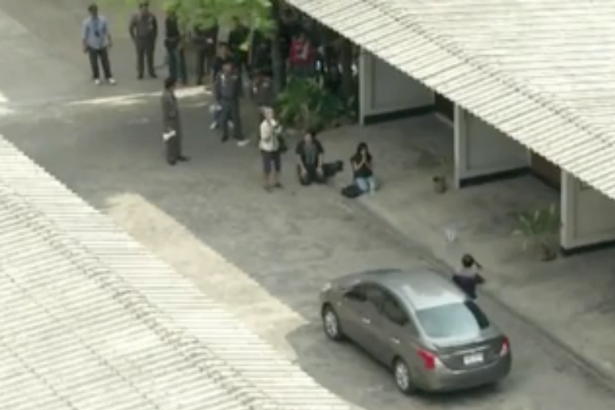Live telecast of fugitive suicide triggers debate in Thailand
Sign up now: Get ST's newsletters delivered to your inbox

The tense five-hour standoff between police and university lecturer Wanchai Danaitamonut on May 19, 2016 was broadcast live on Facebook and television in Thailand.
-- PHOTO: THAIRATH TV/FACEBOOK
Follow topic:
Clad in a black T-shirt and bermuda pants, the man clutched a handgun as he paced near his car in the emptied out parking lot.
A slight woman in a flak jacket edged closer as she pleaded with him to stop.
He backed away and then pointed the gun at his head.
Tens of thousands of people - if not more - watched this harrowing scenario live on their screens last Thursday (May 19) as police in Bangkok cornered a lecturer suspected of gunning down two of his colleagues at their university.
Major Thai media networks interrupted normal programming over five hours as the unfolding drama went live on Facebook and television, even though Wanchai Danaitamonut, 60, repeatedly pointed the gun at himself during the negotiations. Some reporters threw in accompanying commentary.
The TV networks ignored a demand by the state media regulator to pull the plug, up until Wanchai took his life that evening. The actual suicide took place off screen. But, even for a nation desensitised to gore by regular news TV reports with pixelated clips of bloodied corpses and gruesome crime scenes, the episode proved distressing.
"I'm quite shocked that it happened," Ms Supinya Kangnarong, a commissioner with the National Broadcasting and Telecommunications Commission (NBTC), told The Straits Times. "I can't believe that they decided to do it for five hours."
Aided by new technology - Facebook's recently launched live-streaming application - and compelled by the need to boost ratings, the TV stations kept their cameras trained on Wanchai even though what was initially a police raid had darkened to an imminent suicide.
On Monday, the NBTC summoned executives of four TV channels - Spring News, TNN 24, Thairath, which is affiliated to the best-selling newspaper in the country, and Nation, which is linked to an English daily of the same name.
They argued that the broadcast was done out of public interest. Mr Bagbun Bunlert, a Spring News executive, told reporters: "The public may see it as a violation of privacy… but this doctorate holder killed two other doctorate holders in a government office, so we don't think it's a private matter."
They had not expected negotiations to lead to a suicide, he said.
"We tried our best to meet ethical guidelines by blurring the images and taking it from high angles," he said. "We did our duty the best we could."
According to news reports, Wanchai had shot his two colleagues in the head while they were listening to a student defend his thesis at the capital's Phranakhon Rajabhat University. He left behind suicide notes detailing the conflicts he had with them.
Wanchai then fled to Suparp Hotel, where he was surrounded by policemen and eventually killed himself.
The NBTC will hear out the media companies before deciding what kind of sanctions they will face, said Ms Supinya. "It's a collective mistake and they are very reluctant to criticise themselves," she added.
But what's too graphic for mass consumption is still drawing eyeballs out on the internet.
As of Thursday morning (May 26), an hour-long clip of the episode uploaded by Thairath TV on Facebook was viewed almost one million times.

